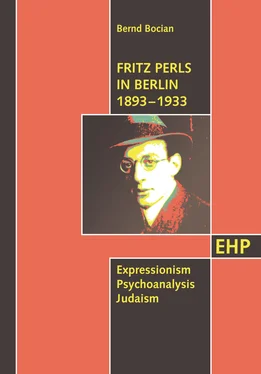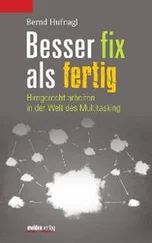Bernd Bocian - Fritz Perls in Berlin 1893 - 1933
Здесь есть возможность читать онлайн «Bernd Bocian - Fritz Perls in Berlin 1893 - 1933» — ознакомительный отрывок электронной книги совершенно бесплатно, а после прочтения отрывка купить полную версию. В некоторых случаях можно слушать аудио, скачать через торрент в формате fb2 и присутствует краткое содержание. Жанр: unrecognised, на английском языке. Описание произведения, (предисловие) а так же отзывы посетителей доступны на портале библиотеки ЛибКат.
- Название:Fritz Perls in Berlin 1893 - 1933
- Автор:
- Жанр:
- Год:неизвестен
- ISBN:нет данных
- Рейтинг книги:3 / 5. Голосов: 1
-
Избранное:Добавить в избранное
- Отзывы:
-
Ваша оценка:
- 60
- 1
- 2
- 3
- 4
- 5
Fritz Perls in Berlin 1893 - 1933: краткое содержание, описание и аннотация
Предлагаем к чтению аннотацию, описание, краткое содержание или предисловие (зависит от того, что написал сам автор книги «Fritz Perls in Berlin 1893 - 1933»). Если вы не нашли необходимую информацию о книге — напишите в комментариях, мы постараемся отыскать её.
Fritz Perls in Berlin 1893 - 1933 — читать онлайн ознакомительный отрывок
Ниже представлен текст книги, разбитый по страницам. Система сохранения места последней прочитанной страницы, позволяет с удобством читать онлайн бесплатно книгу «Fritz Perls in Berlin 1893 - 1933», без необходимости каждый раз заново искать на чём Вы остановились. Поставьте закладку, и сможете в любой момент перейти на страницу, на которой закончили чтение.
Интервал:
Закладка:
In 1896, that is, three years after the birth of his son Friedrich Salomon, Nathan Perls was able to move his family to a better neighborhood, »a more fashionable part« (Perls 1977, 61) of Berlin, in the center of town to the West. The typical neighborhoods for rising Jewish families were Wilmersdorf and Charlottenburg. Nathan moved his family to the vicinity of Kurfürstendamm, where Charlottenburg borders on Wilmersdorf. Number 53 Ansbacher Strasse, 20where the Perls family lived for roughly twelve years, belonged to the so-called Bavarian Quarter. It was a middle-class neighborhood with a correspondingly large number of Jews, such as Albert Einstein, Wilhelm Reich, Erich Fromm, and Otto Fenichel, to name only four examples from the post-World War I years. The members of the Perls family lived in and around the Bavarian Quarter between the years of 1897 and 1942, the year when the 58 th»Elderly Transport« took Amalie Perls and her oldest daughter to the Theresienstadt concentration camp, in other words, »back« to the East of the German Empire. Their addresses belonged to Charlottenburg or Wilmersdorf respectively, and the apartments of the family members were all relatively close to one another. Distant relatives also lived on Ansbacher Strasse, such as the upper class Straubs from the mother’s side of the family.
Due to the housing shortage, one of the characteristics of Berlin’s urban architecture was that every square meter of building land was utilized by speculators. So-called »canyons« had formed out of rear building courtyards where the apartments never received any light and large families often lived – better said, vegetated – in a single, dank room. The expression, »You can kill a person just as easily with an apartment as you can with an axe« stems from this period, when Berlin was called the world’s largest tenement city (Ribbe et al. ibid., 109).
The Perls family’s first apartment was situated in such a rear building and had four rooms (see F. Perls 1977, 281). Later, they apparently moved to the front building and had a »servant girl« (see ibid. 249). Four rooms for a start probably means that there were more later on, and I would like to remind the reader that Lore Perls came from an affluent, upper-class assimilated Jewish family that lived in a house of its own and employed several servants. To me, Fritz Perls’s self-categorization as »lower middle-class« appears to be an understatement. Viewed against the backdrop of society overall and the social condition of the working class in particular, his circumstances amounted to a solid, middle-class starting position.
Nathan Perls appears to have owed his rise to cooperation with the House of Rothschild. Baron Edmond de Rothschild was a member of the Frankfurt branch of the Rothschild family. He headed the Rothschild bank in Paris and had at his disposal an enormous fortune that he used to support Jewish settlements in Palestine, among other projects. Rothschild’s endeavors were by no means intended to create a Jewish national state on Palestinian soil. The idea of nationhood arose in conjunction with the Zionist movement. Given the environment between 1870 and 1890 when nationalism was flaring all across Europe, Zionists began to relinquish the idea of assimilation and elevated the Jewish question to the national level with the goal of founding a »Jewish State.«
In the year 1897, the First International Zionist Congress convened in Basel. German-born Moses Hess and Theodor Herzl, who came from Budapest, were the pioneers of this concept. Herzl’s abandonment of the assimilation idea was triggered by the anti-Semitic atmosphere surrounding the Dreyfus trial in 1896 in France, where Herzl had been posted as the correspondent of a Viennese newspaper. Looking back in 1899, he wrote the following for »Die Welt,« a Zionist weekly published in Germany:
There is more to the Dreyfus case than a mere judicial error; it involves the desire of the vast majority of Frenchmen to condemn a Jew, and in so doing to condemn all Jews. Death to the Jews! the rabble cried out, as the insignia of rank were ripped from the Captain’s uniform. (…) Where? In France. In the republican, modern, civilized nation of France, one hundred years after the declaration of human rights. (in Battenberg 1990b, 216)
Thus, differing motives and strategies came into play with respect to the settlement of Palestine. Rothschild provided financial support for hard-pressed settlement projects and assumed a protectorate, not in the sense of heading a political project, but for the purpose of reorganizing practical tasks. He had new farming methods introduced, drained swampland, and organized the construction of wine cellars and the sale of the products. The colonialists increasingly lost their autonomy and became »employees of a huge charity concern« (Battenberg ibid., 213). Nathan Perls appears to have been an independent agent for Palestinian wines from the Rothschild colonies. Records 21from the Colonie Richon-Le-Zion in Jaffa show a German agency named »Gsll. Palästina,« that is, »Import Gesellschaft Palästina G.m.b.H.« (Palestine Import Company, Inc.) in 1902/1903, which was located on »St. Wolfgang Str. in Berlin C.« (in the center of Berlin). This information is also printed on the wine labels. 22»St. Wolfgangstrasse,« as it is called on old maps of the city, was right in the center of town in the vicinity of Charlottenburg Palace.
3.3 Childhood. Father Conflict and Rebellion
I was thrown into a family where children were not the deeply desired answer to two people in love. (Perls1977, 247)
Perls recalled experiencing great affection up until the age of nine. He quoted a remark by his grandparents: »He is made from such stuff that gathers love from God and Man« (Perls 1977, 247). Even when he had grown very old, this picture of a distant golden age endured. »I must have been a lovable child indeed. Affectionate, eager to please and to learn« (ibid. 247). Studious little Fritz knew how to read and do arithmetic even before he entered school. His grandparents’ many books were available to him (Mark Twain, for example), as were the servant girl’s mystery novels. His father kept his own books in a locked room. Entering the forbidden room of his patriarchal father, the »secret room,« (ibid. 251) was a key childhood experience even though all it contained were books on Freemasonry. To me, this personality trait appears to be typical for Perls. He wanted to reveal secrets and enter forbidden chambers where experience and knowledge might lie hidden. On this occasion, he also stole a gold coin which had been earmarked for the dowry of one of his sisters. When the theft came to light, he ran off in panic and spent several days on the street and with friends. Upon returning home, he had to face an assembly of the family which had been expanded by the presence of the key male figures from his mother’s side. He did not feel that the absolution his father ultimately granted was genuine. He believed that it was not true forgiveness but rather a false, quasi-theatrical gesture in the sense of contrived Masonic humanism. This event occurred during a disconcerting period that traumatized his selfesteem. He expressed it with the words, »I was ›good‹ for many years until I slowly turned ›bad‹« (ibid., 247). His transition from elementary school to a Gymnasium, which was proceeding in parallel, was fraught with problems. Fritz had grown accustomed to having only the best grades, so when he encountered difficulties in the entrance examination it came as a shock. He had experienced the elementary school atmosphere as »warm,« but found the Gymnasium »strange and rigid« (ibid., 248).
Perls’s failure in secondary school can certainly be viewed as a massive violation of his childhood self-confidence, and its intensity was co-determined by a change in atmosphere at home. Traditionally, it was his mother who attended to his education, and now »the great ambition of her life melted away« (ibid., 252) as her son’s performance at school dropped. A kind of combative relationship developed between mother and son. Out of fear of his parents, Fritz began to lie and cheat. He intercepted official disciplinary letters from school and forged his parents’ signatures below poor test grades. His mother apparently reacted with helpless disappointment and, as was the custom of the times, with physical blows. Fritz became »untamable« (ibid., 252) and cut off the strips on the cat o’ nine tails, a kind of whip she used to beat him. Other instruments she used to hit him fared no better. »My mother used those carpet beaters on me. She did not break my spirit; I broke the beaters« (ibid., 280). On a different occasion, he wrenched free from her grasp, slammed a door behind himself, broke the pane of glass, and made faces at her. Several passages in the biography Perls wrote as an old man reveal how greatly his rebellion and his belated and circuitous route to success were still influenced by his yearning to fulfill his parents’ expectations, particularly his mother’s. It is as if Grete, his favorite sister, is assuming the position of his mother when she expresses her pride »that her black sheep of a brother is becoming famous (ibid., 182). Nor did Perls forget to quote his sister as saying, »If only Mama could have experienced it« (ibid.) The following remark is also one that I do not view as irony, but rather as an expression of a deep sense of injustice and yearning from his childhood days: »At that time in Germany it never occurred to anyone that the drop-out of a bright, warm kid might not be his fault alone« (ibid., 252).
Читать дальшеИнтервал:
Закладка:
Похожие книги на «Fritz Perls in Berlin 1893 - 1933»
Представляем Вашему вниманию похожие книги на «Fritz Perls in Berlin 1893 - 1933» списком для выбора. Мы отобрали схожую по названию и смыслу литературу в надежде предоставить читателям больше вариантов отыскать новые, интересные, ещё непрочитанные произведения.
Обсуждение, отзывы о книге «Fritz Perls in Berlin 1893 - 1933» и просто собственные мнения читателей. Оставьте ваши комментарии, напишите, что Вы думаете о произведении, его смысле или главных героях. Укажите что конкретно понравилось, а что нет, и почему Вы так считаете.











